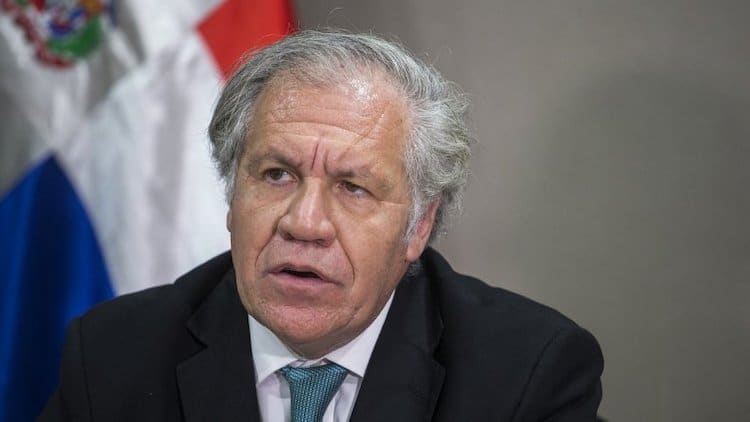Freedom is up for a vote in the Western Hemisphere

On March 20, the Organization of American States (OAS) will hold an election for its next secretary general. The incumbent, Uruguayan Luis Almagro, has rejuvenated the once-fading institution and is among the boldest pro-democracy voices in the Americas. Unsurprisingly, Venezuela is quietly mobilizing its regional allies to defeat him. Surprisingly, democratic nations from Canada to Mexico to Argentina may help Venezuela succeed.
Secretary General Almagro has earned this opposition through his principled leadership. Established in 1948 to help the Western Hemisphere become a “land of liberty,” by the 21st century it had a reputation for supporting dictators over democrats. In 2009, the OAS voted to readmit Cuba after a 47-year suspension, despite that country’s widespread human rights abuses. It also turned a blind eye to Hugo Chávez’s and Nicolás Maduro’s despotism in Venezuela, Evo Morales’s autocratic socialism in Bolivia, Daniel Ortega’s authoritarian turn in Nicaragua, and Cuba’s long-term communist autocracy.
Like the United Nations, the OAS often has struggled to advance its mission because it gives free nations an equal vote with authoritarian regimes.
Almagro has worked around these structural limitations since his election in 2015. Whereas previous secretaries general stayed silent, he has used his platform to force debate and focus the region’s attention on violations of human rights. Nowhere have his efforts been more evident than with Venezuela.
From the start, Almagro criticized Caracas for oppressing its citizens and rigging elections. As Maduro’s vice-grip on the country tightened, Almagro invoked the Inter-American Democratic Charter to convene the OAS for a debate on the Venezuelan crisis. He has called for the International Criminal Court to investigate Maduro’s crimes and, in 2019, he backed Juan Guaidó as the legitimate president of Venezuela.
The secretary general also has been a strong voice for the return of democracy in Nicaragua. As with Venezuela, in 2019 he took steps to force debate on the country’s crisis and potentially suspend it.
And Almagro is a public enemy of Cuba. In 2018, he oversaw an OAS conference on Cuba’s human rights record, in which he pledged to speak “openly, without fear, about the crimes against humanity in Cuba.” By contrast, his predecessors could hardly muster an unkind word about Havana’s oppression.
Given his record, the United States under President Trump has been one of the secretary general’s strongest supporters. Vice President Pence explicitly praised him in a speech at the OAS in 2018. Yet, while the U.S. has backed Almagro, Venezuela and Cuba are desperate to see him gone.
Venezuela’s regime is counting on the Caribbean countries it financially supports to vote en masse for Almagro’s ouster. The Maduro regime’s preferred candidate is María Fernanda Espinosa, a socialist former foreign minister from Ecuador. If elected, she surely will drop the organization’s focus on her ideological allies in Caracas and Havana.
But Venezuela’s Caribbean allies aren’t the only ones backing Espinosa. She also has the support of Argentina, Nicaragua and Mexico. These two countries likely want to return to the days when the OAS didn’t stand for much, and therefore didn’t ruffle any feathers.
But Canada apparently wants the same thing. By refusing to back Almagro, Canada is undermining the cause of freedom — and supporting Venezuela.
So are outside groups such as Amnesty International, which has attacked Almagro for a supposed lack of action on human rights. Yet he has done more on this issue than any OAS leader in decades. If he is defeated, the OAS is all but certain to do less — not more — to advance human rights and democracy in the Western Hemisphere.
Currently, Almagro is hovering near the necessary majority for re-election, with several countries still uncommitted. Mexico and Canada are working behind the scenes to delay the election, giving them more time to defeat him. The United States should vigorously work to convince our allies and partners to back the secretary general. Whether he wins or not, the U.S. also should push for reforms that would make it easier to punish oppressive nations such as Venezuela and reward those countries fighting to preserve democracy in Latin America.
The Organization of American States is far from perfect, but any reforms will be harder if the OAS slides back toward weakness and moral ambiguity. Freedom without champions is an empty concept. We must back those who take the political risk to defend it. Now is the time to double down, not back down, on defending freedom and democracy across the Western Hemisphere.
Only Secretary General Luis Almagro will do so, and he deserves a second term.
Marion Smith is executive director of the Victims of Communism Memorial Foundation in Washington, D.C.

